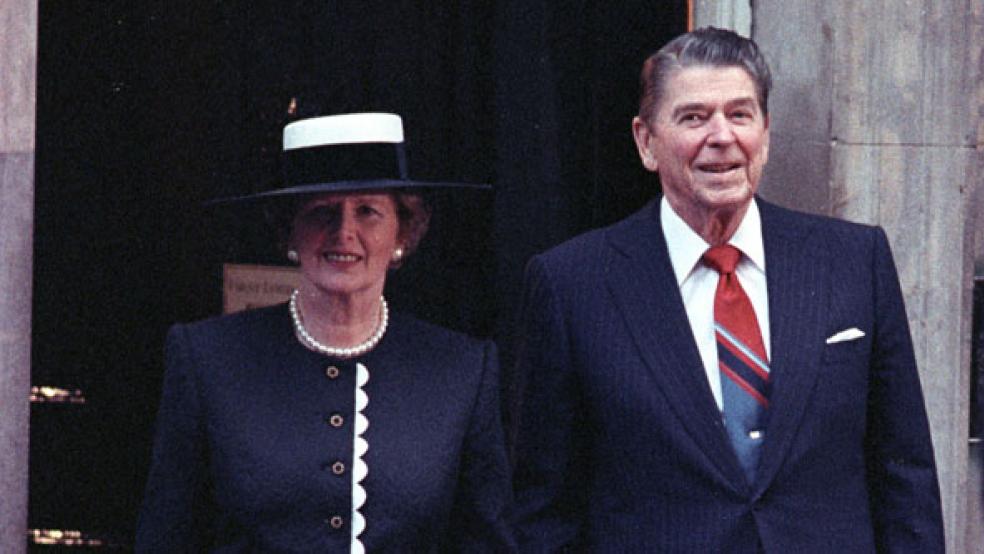“The Bitch is Dead,” read the banner paraded through the streets of London yesterday – proof that hatred of Margaret Thatcher lives on, even in death.

Of all the extraordinary accomplishments of Britain’s only female prime minister, surely her outsized and continuing impact on the nation’s psyche is one of the most remarkable. Hardly a contemporary British story is written or West End play produced – witness Billy Elliott or even the comic One Man, Two Guvnors – that doesn’t slam the former leader. “Thatcherism” in some quarters is as loathed as “McCarthyism” in the U.S.
Why this animus? Because Mrs. Thatcher dared to take on what we call today the “special interests” that threatened England’s very survival – the trade unions and their allies. She convinced voters that the country would prosper only through the utter defeat of those who undermined England’s competitiveness and success and then went on to defeat them. For this, she will never be forgiven.
RELATED: Thatcher Inspired Conservatives Around the Globe
The courage to confront the unions and their big government enablers, to stem Britain’s decline into socialism, took guts – the kind that’s rare in the United States today. Our country is slip sliding towards mediocrity in much the same way Britain did in the 1970s.
More and more of our policy decisions are driven not by what’s best for the U.S. but rather what’s best for politicians who chase after voting blocks like hounds on the scent and whose favors are often for sale to the highest bidder. The efficiency of markets has been sidelined for the inefficiencies of K Street loyalties and central planning.
We have a president who believes that private enterprise is like a puppy – to be patted reassuringly on the head – but not allowed full run of the house. His most notable achievement to date was to place the boot-heel of government effectively on the neck of healthcare, one sixth of our economy.
President Obama does not believe in the capacity of the marketplace to sort out the bewildering challenges of lower-cost healthcare -- or efficient energy policy, or common sense immigration reform or sluggish growth -- he believes in bureaucrats.
Mrs. Thatcher knew better, as did her ally Ronald Reagan. For both, the stranglehold of labor unions and a bloated government-infested economy were out-of-control beasts to be tamed. In 1979, the year she took office, the U.K. suffered 29 million workdays lost to strikes. The disruptions not only cost the country dearly in forgone output, but discouraged those who might invest and build in the U.K.
Today, the number of days lost to work disputes is negligible.When Thatcher became prime minister, marginal tax rates were 83 percent on earned income and 98 percent on unearned income; ambitious Britons were fleeing the country. Seeking to attract and keep those who might help rebuild the nation, Thatcher lowered rates to 40 percent. Under Thatcher, the deficit dropped from 5.8 percent of output to 1.8 percent; state-run industries accounted for 2 percent of GDP at the end of her term, down from 10 percent at the start.
While the measures she pushed through were tough on coal miners and others who could only succeed under the cosseting regime of government ownership, for the nation as a whole, her policies led to a revival of growth and opportunity.
Not everyone shared Mrs. Thatcher’s vision. But her goals were clear and unwavering -- as unwavering as her admiration of thrift, ambition and hard work. She embraced competition and rewarding those who were productive – a philosophy not too popular in the U.S. these days.
Instead, we have conceived and nurtured a society increasingly reliant on government support. Consider the shocking shrinkage of our workforce. Last week’s report that we created only 88,000 jobs in March was dismal across the board, but most unnerving was that another 496,000 decided against looking for a job. Workforce participation has plunged to 63.3 percent, the lowest since 1979 – a time when fewer women earned money outside the home.
Numerous analysts have pointed to burgeoning disability rolls to explain our disappearing labor ranks. The Social Security Administration reports that there are now 8.8 million people collecting disability payments averaging $1,130 per month, up from 3.5 million twenty years ago who received a $625 monthly stipend. Including spouses and children, the number swells to 10.9 million. The number receiving disability has increased much faster than the workforce overall. At the end of 1968, there were roughly 51 Americans working for every one collecting disability. Ten years ago the ratio was 24 to 1. Today that ratio has plummeted to 13 workers for every one on disability.
Many charge it is simply too easy to sign up for disability benefits and too difficult to jump off. The list of maladies for which one can claim disability benefits has expanded over the years and now includes many categories that are as hard to disprove as to prove. Hearings requesting payments are one-sided; the applicant’s case is argued by a lawyer who stands to harvest fees while the government (and the taxpayer) often has no representation at all. Meanwhile, annual payments run only $2,000 less than a minimum wage job. Why work?
Only if you can envision a better future for you and your family. Only if you are optimistic that you will be rewarded for your success. That’s the formula that Maggie Thatcher understood.
A dependent society is a failed society. Those advocating increasingly generous handouts to the old, the poor, the sick, the unlucky, the illiterate, the unemployed, the uncompetitive – the list goes on and on – ultimately jeopardize our ability to care for those who truly need help. Pushing back against the insidious welfare tide engenders hatred and resentment; it takes courage. Actually, it may take a bitch.





